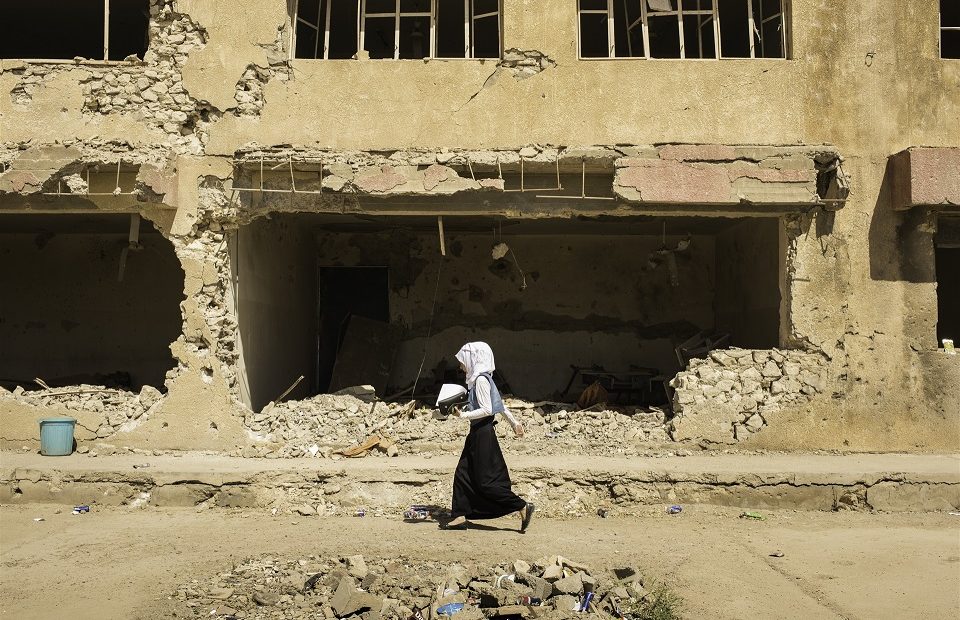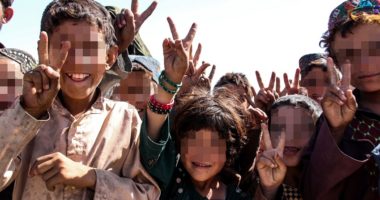‘Sadiq’ is 15 years old and from Sinjar district in northwest Iraq. He cannot write his own name.
Sadiq’s education has been successively destroyed by war, displacement, and now, COVID-19.
Sadiq should be in 9th grade, but for three years, beginning in 2014, his hometown was ruled by the group known as Islamic State. The armed group not only prohibited formal secular education in areas they controlled, but also attacked schools and used them for military purposes, such as for bases or weapons storage, in contrast to Islamic law’s general emphasis on the importance of education.
His family, who are Arab, fled Sinjar in 2017 and Sadiq then spent more than a year in a camp for internally displaced people. The camp had no education opportunities for him either. Finally, in 2019, Sadiq and his family were able to return to their hometown, but it took three more months for the school there to assemble the teachers and materials to reopen.
It wasn’t until December 2019 that Sadiq finally returned to school, having lost years of studies. He started doing well. But in less than three months, his school closed due to the COVID-19 pandemic.
His school offers no distance education, so Sadiq is at home doing very little. His father is busy running a store, and his mother is illiterate so cannot help much with his education.
‘We are moving from one crisis to another and the children are paying the price’, his father told us at Human Rights Watch.
Today, the United Nations marks its first International Day for the Protection of Education from Attack. That it should come amid the COVID-19 pandemic, which drove more than 1.5 billion students out of school earlier this year, makes the day particularly poignant.
But children living in countries affected by armed conflict were already the most at risk of being excluded from education, even before the pandemic. Sadiq is one of them. In many current conflicts, education isn’t just collateral damage: teachers, students, and schools are intentionally targeted. According to the Global Coalition to Protect Education from Attack there were at least 11,000 reports of attacks on students, teachers, schools, or universities, or the military use of educational facilities globally between 2015 and 2019. These incidents harmed over 22,000 students, teachers, and education personnel. Even as COVID-19 has stopped students and teachers from being able to meet in the classroom, it could not stop armed forces or armed groups from attacking schools.
Just as the COVID-19 pandemic intensifies the consequences on education systems that have been weakened by armed conflict, so too can armed forces exacerbate the consequences of COVID-19 on students’ education.
In just one recent example, on June 14th, atop vehicles mounted with machine guns, paramilitaries stormed a primary school for girls in Kadogli, the capital of Sudan’s Southern Kordofan state. The armed men, from Sudan’s Rapid Support Forces, dug a trench around the school, and began using it as a military training base.
The school was not in use. Like others around the world, it had closed due to the COVID-19 pandemic, and the girls were temporarily sent home. However, the school was supposed to reopen for students to take secondary-school entrance exams. Instead, the paramilitaries would not let residents near the school, and the students were unable to return.
The use of schools or universities for military purposes – such as converting them into military bases, barracks, weapons storage, or, as in this case from Sudan, training bases – was reported in at least 33 countries between 2015 and 2019 according to the Global Coalition to Protect Education from Attack. The use of schools for military purposes endangers students and teachers, as well as students’ education.
But it doesn’t have to be this way. Diverse legal and military examples from around the world illustrate that the military use of schools cannot only be minimized, but often avoided entirely. Many of these examples of good practice have emerged following the opening of the Safe Schools Declaration for States to endorse in 2015. Once States have endorsed the Safe Schools Declaration, the ICRC can incorporate the declaration’s protections into its dialogues with relevant authorities. The organisation Geneva Call also engages with armed non-State actors, including on their Deed of Commitment for the Protection of Children’s pledge to avoid the use of schools for military purposes.
Indeed, in recent months we have seen new efforts to protect schools from military use. In July, the Syrian Democratic Forces issued an order to all commanders to ‘refrain from using schools for military purposes and from placing equipment or weapons near them, except in cases of extreme military necessity, when schools are exposed to aggression from other military parties and need protection’, and promptly vacated ten schools.
And in August, Mali’s then-education minister wrote to the Defense Ministry to remind the armed forces of their commitments under the Safe Schools Declaration to avoid using any school currently vacant due to the COVID-19 pandemic for military purposes.
Such positive examples feel particularly valuable when the situation otherwise seems so grim. An international day to mark the protection of education from attack is especially needed now – if it leads to more constructive results.
The decision by Niger to use its presidency of the UN Security Council to issue a presidential statement tomorrow on the protection of education from attack – drafted together with Belgium, the chair of the Security Council’s Working Group on Children and Armed Conflict – in recognition of the new day, is a positive step. It should prompt the Security Council to consider the concrete measures it could advance in a dedicated resolution on the topic in the year to come. Possible measures include:
- Addressing education not only through its ‘children and armed conflict’ agenda, but also taking up the issue of protecting higher education students, educators, and institutions through the Council’s ‘protection of civilians’ agenda.
- Insisting that the UN Secretary-General list all parties that attack students, teachers, and schools in his annual report to the Security Council on children and armed conflict based on the evidence, not political pressure or influence.
- Demanding real accountability for threats and attacks on students, teachers, schools, and other education institutions. Despite some ‘salutary efforts’, much remains to be done to recognize, prevent, and punish the spectrum of conflict-related crimes against or affecting children.
- Advocating that regional peacekeepers adopt rules like those developed by the United Nations Department of Peacekeeping Operations, which ban their peacekeepers from using schools in their operations. The African Union has played a meaningful role in pushing for the realization of the rights and protections of children in armed conflict, including by its Peace and Security Council repeatedly urging its members to endorse the Safe Schools Declaration. African Union peacekeepers should ban their troops from using schools.
- Calling for the re-establishment of education facilities following attacks and ensuring the continuation of education during armed conflict. This approach can include programmatic responses with meaningful participation of affected communities.
- Asking the UN Secretary-General to report lessons learned and best practices on the protection of students, teachers, schools, and other education institutions during armed conflict.
- Urging all Member States to follow the example of the majority of UN members, and endorse the Safe Schools Declaration.
The establishment of an International Day for the Protection of Education from Attack was overdue. After all, protections for education from interference by the military date to at least 333 CE, explicit protections for students during times of war date back at least to 697 CE, and protections for schools from attack date at least to 1631. But ongoing attacks, compounded by the COVID-19 pandemic, means this historic occasion deserves more than just commemoration and celebration. It demands genuine action too.
See also
- Filipa Schmitz Guinote, Three reasons why education needs the support of humanitarian actors in conflict zones, December 12, 2019
- Ezequiel Heffes & Carolin Nehmé, Ten armed groups share their views on education in armed conflict, May 2, 2018






Thanks for finally talking about > Protecting education from attack during
COVID-19: a new day, a new call to action – Humanitarian Law & Policy Blog | Humanitarian Law
& Policy Blog < Loved it!
Feel free to visit my web-site https://danetidwell.com/